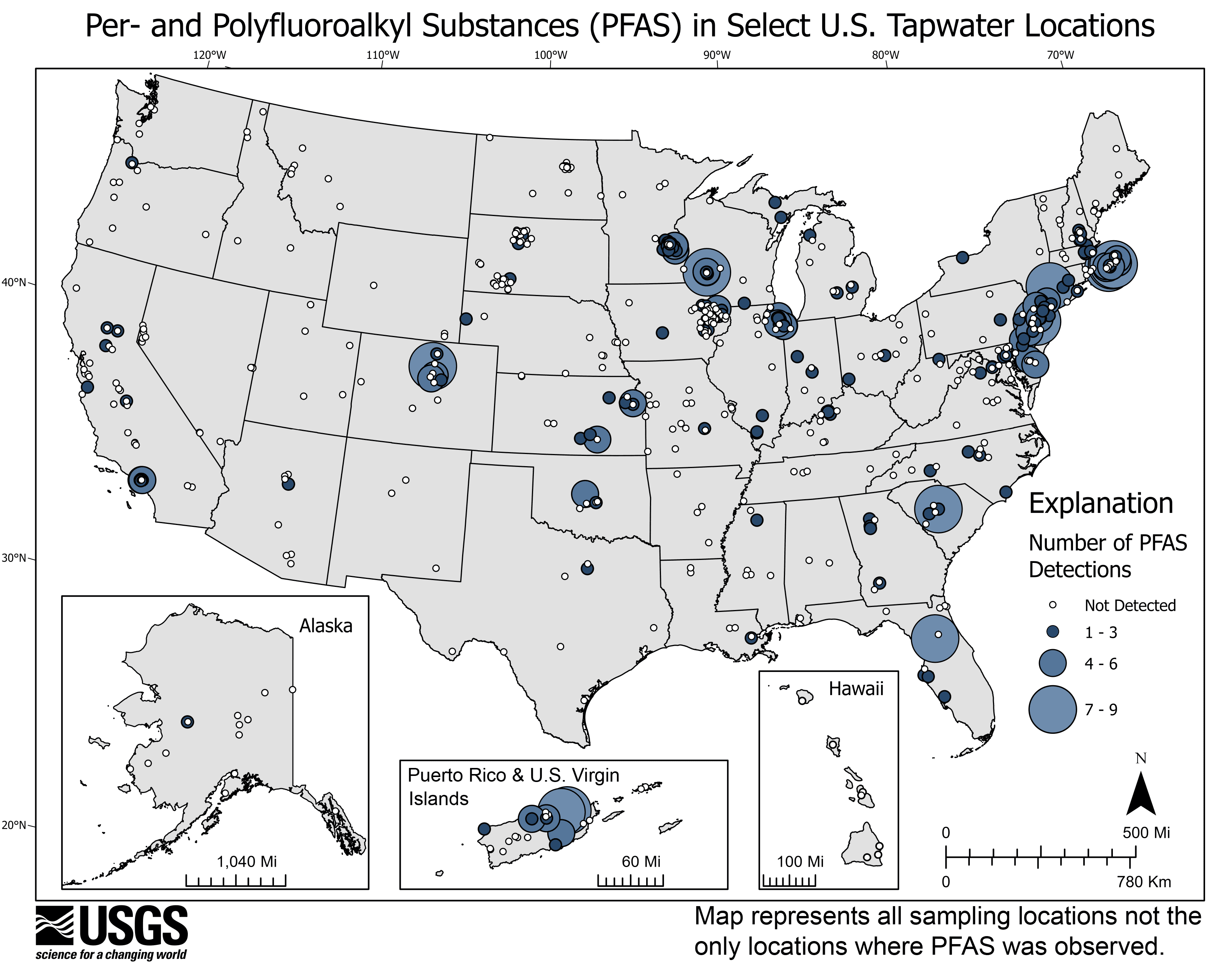- The U.S. Geological Survey will host a webinar on per- and polyfluoroalkyl substances (“forever chemicals”) on January 24, 2025.
- The Environmental Working Group criticizes the recent withdrawal of proposed discharge limits for these chemicals.
- An executive order from President Donald Trump places a freeze on new federal regulations pending review.
January 24, 2025 — The U.S. Geological Survey (USGS) has scheduled a webinar titled “Predictions of PFAS in groundwater at drinking water supply depths in the United State s” to be held today. The session, featuring research hydrologist Kelly Smalling from the New Jersey Water Science Center, focuses on contamination concerns linked to per- and polyfluoroalkyl substances (PFAS).
s” to be held today. The session, featuring research hydrologist Kelly Smalling from the New Jersey Water Science Center, focuses on contamination concerns linked to per- and polyfluoroalkyl substances (PFAS).
According to the USGS’ announcement, “Per- and polyfluoroalkyl substances (PFAS), known colloquially as ‘forever chemicals,’ have been associated with adverse human health effects and have contaminated drinking water supplies across the United States owing to their long-term and widespread use. People in the United States may unknowingly be drinking water that contains PFAS because of a lack of systematic analysis, particularly in domestic water supplies. We present an extreme gradient–boosting model for predicting the occurrence of PFAS in groundwater at the depths of drinking water supply for the conterminous United States. Our model results indicate that 71 million to 95 million people in the conterminous United States potentially rely on groundwater with detectable concentrations of PFAS for their drinking water supplies before any treatment.”
The webinar is set amidst an emerging regulatory battle. The link to join the webinar is posted on the USGS’ announcement page.
is posted on the USGS’ announcement page.
Trump freezes regulatory efforts.
President Donald Trump issued an executive order on January 20, 2025, titled “Regulatory Freeze Pending Review .” It instructs all executive departments and agencies to pause new rulemaking efforts until a designated appointee has had the opportunity to review and approve any proposed rules. This order also directs agencies to withdraw or delay rules that have not yet taken effect, unless they meet specified exceptions or urgent circumstances.
.” It instructs all executive departments and agencies to pause new rulemaking efforts until a designated appointee has had the opportunity to review and approve any proposed rules. This order also directs agencies to withdraw or delay rules that have not yet taken effect, unless they meet specified exceptions or urgent circumstances.
Environmental concerns.
Days later, the Environmental Working Group (EWG) released a statement criticizing the Trump EPA’s decision to withdraw a pending plan for PFAS effluent limits. The statement reads, in part (source: EWG statement, January 22, 2025 ):
):
Yesterday’s action by the Trump administration to withdraw the long-awaited proposal on PFAS effluent limits is a devastating setback in the fight to protect our communities from toxic “forever chemicals.”
This move not only delays establishing critical federal standards but also sends a dangerous message giving polluters a green light to continue poisoning our water and communities without fear of consequence.
It’s an unconscionable betrayal of the public’s health in favor of corporate interests, and it underscores this administration’s troubling shift in policy which threatens to roll back any progress to protect our environment and hold polluters accountable.
PFAS contamination is already a public health crisis. The science is clear: PFAS are toxic at even the smallest levels, and they have been linked to serious health problems, including cancer, immune suppression and developmental harm. Communities across the country, especially those near PFAS-manufacturing facilities, have lived with the devastating consequences of this pollution for decades.
State regulators have waited for the federal government to lead on this issue so they can incorporate effective monitoring and treatment requirements into their discharge permits. Without federal limits, those efforts remain stalled.
The Trump administration’s refusal to act now puts even more lives at risk, leaving American communities to fend for themselves as polluters continue their unchecked discharges of toxic PFAS into our water.
State actions.
Safer States reports that as of December 2024, attorneys general in thirty states, along with the District of Columbia, have filed lawsuits against manufacturers of PFAS. These legal actions address alleged contamination of drinking water and other natural resources.
reports that as of December 2024, attorneys general in thirty states, along with the District of Columbia, have filed lawsuits against manufacturers of PFAS. These legal actions address alleged contamination of drinking water and other natural resources.
Below are the states that have initiated or settled lawsuits:
- Alaska
- Arizona
- Arkansas
- California
- Connecticut
- Colorado
- Delaware (settled)
- District of Columbia
- Hawaii
- Illinois
- Indiana
- Maine
- Maryland
- Massachusetts
- Michigan (settled)
- Minnesota (settled)
- New Hampshire
- New Jersey (settled)
- New Mexico
- New York
- North Carolina
- Ohio (settled)
- Oregon
- Pennsylvania
- Rhode Island
- South Carolina
- Tennessee
- Texas
- Vermont
- Washington
- Wisconsin
Image (public domain):
This USGS map dated January 1, 2022 , shows the number of PFAS detected in tap water samples from select sites across the nation. The findings are based on a USGS study of samples taken between 2016 and 2021 from private and public supplies at 716 locations. The map does not represent the only locations in the U.S. with PFAS. Most of the exposure was observed near urban areas and potential PFAS sources. This included the Great Plains, Great Lakes, Eastern Seaboard, and Central/Southern California regions. The study’s results are in line with previous research concluding that people in urban areas have a higher likelihood of PFAS exposure. USGS scientists estimate that the probability of PFAS not being observed in tap water is about 75% in rural areas and around 25% in urban areas.
, shows the number of PFAS detected in tap water samples from select sites across the nation. The findings are based on a USGS study of samples taken between 2016 and 2021 from private and public supplies at 716 locations. The map does not represent the only locations in the U.S. with PFAS. Most of the exposure was observed near urban areas and potential PFAS sources. This included the Great Plains, Great Lakes, Eastern Seaboard, and Central/Southern California regions. The study’s results are in line with previous research concluding that people in urban areas have a higher likelihood of PFAS exposure. USGS scientists estimate that the probability of PFAS not being observed in tap water is about 75% in rural areas and around 25% in urban areas.





Leave a Reply